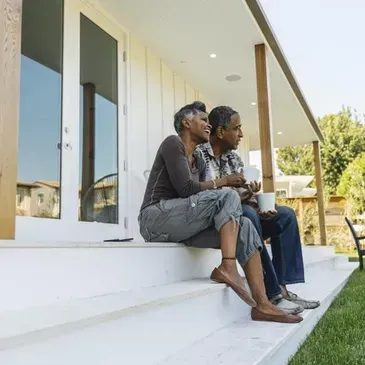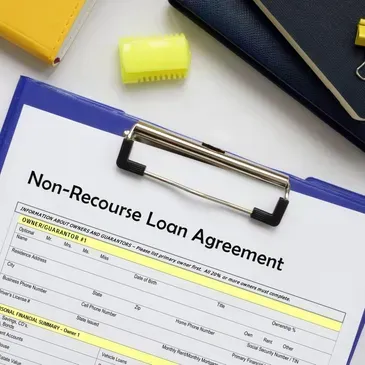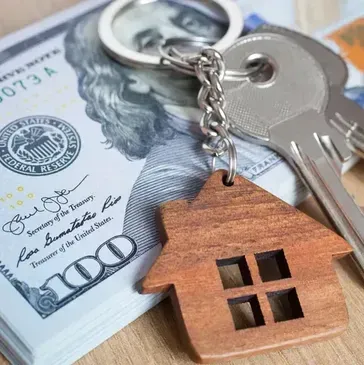Reverse Mortgage Facts
Making Your Future a Success
SAFE EQUITY SOLUTIONS FOR SENIOR HOME OWNERS AND BUYERS

Personalized Mortgage Experience
A reverse mortgage allows homeowners to tap into the equity of their homes, providing them with a steady stream of income or interest bearing Line of Credit without needing to sell their property.

No Monthly Mortgage Payments
Unlike traditional mortgages, reverse mortgages typically do not require monthly mortgage payments. Instead, the loan balance accumulates over time and is repaid when the borrower moves out of the home or passes away.

No Repayment Until You Move
Repayment of the loan is typically deferred until the borrower moves out of the home, either by selling it or passing away. This can provide peace of mind for seniors who wish to age in place.

Stay In Your Home
Seniors can continue to live in their homes as long as they meet the loan requirements, such as maintaining the property and paying property taxes and insurance.

Non-Recourse Loan
Reverse mortgages are non-recourse loans, which means that the borrower (or their heirs) will not owe more than the home is worth at the time of repayment, even if the loan balance exceeds the home's value.

Tax-Free Proceeds
The proceeds from a reverse mortgage are generally not considered taxable income, providing a tax-efficient way to access home equity. Use the cash for anything your want or need, from travel to medical expenses to buying a rental property for cash flow and an appreciating asset to pass on to your heirs - it’s your equity - it’s your money!
Meet Kenn Bartley
Experience the best reverse mortgage experience.
Kenn has been in the mortgage industry since 1992 and has helped thousands for families with their mortgage financing. Now that Kenn is a "seasoned citizen" he is dedicated to helping guide seniors in the right direction when exploring Reverse Mortgage options (aka HECM), and is most proud of advising more seniors to NOT take out a HECM more than advising them to move forward.
"I'm not in this to make a sale. I understand the ramifications. Seniors equity is often all they have, but they can't spend it for life's goals, wants and needs. I know when to say do not do this. I also know when to insist to do this now!"
Don't take our word for it
Frequently Asked Questions
What is a reverse mortgage?
A reverse mortgage is a special loan for homeowners 62 and older. It lets you convert part of your home equity into tax-free cash without having to sell your house.
With this loan:
-You don’t have to make monthly mortgage payments if you don't want to.
-You must still pay property taxes, homeowners insurance, HOA dues (if any), and keep the home in good condition.
-You must live in the home as your primary residence.
You pay back the loan at a later date, usually when the house is sold or you no longer live there.
The most common type is the FHA-insured HECM (Home Equity Conversion Mortgage). This is the only reverse mortgage backed by the federal government. For homeowners with higher-value homes, there are also non-HECM options with loan amounts up to $4 million. In some states, these are available starting at age 55.
At Canopy Mortgage, we offer both FHA-insured HECM loans and non-HECM reverse mortgages, so you can choose what works best for you.
Over 1.36 million Americans have already used a reverse mortgage as part of their retirement plan—94% said it gave them more peace of mind.*
Am I eligible for a reverse mortgage?
To be eligible for a reverse mortgage, you must:
-Be 62 and older (or, 55+ in select states for non-HECM products)
-Live in the home as your main residence
-Keep your home in good shape
-Continue paying all your property charges—like taxes, insurance, HOA fees—just like you would with any other loan
What is the amount of money I could receive from a reverse mortgage?
The amount of money you can receive depends on a few factors:
-The Age of the youngest borrower (generally, the older you are the more money you receive)
-The appraised value of your property
-Current interest rates
How do I receive my money from a reverse mortgage?
The way you receive your money from a reverse mortgage depends on the loan you pick. Your loan will decide if you get the money as the following:
-One big payment upfront
-Monthly payments
-A line of credit you can use when needed
-Or a mix of these choices
Are there rules on how I can use the money from a reverse mortgage?
Nope. You can use the money from a reverse mortgage any way you'd like. Many people use it for everyday expenses, healthcare costs, home repairs, travel, helping family, or anything else that matters to them.
What types of houses are eligible for a reverse mortgage?
Many types of homes can qualify for a reverse mortgage, including:
-Single-family homes
-New construction
-2-4 unit properties—you must live in one unit
-Condos—for HECMs, condos must be FHA-approved. Other types of reverse mortgages, may allow financing for condos that -aren't FHA-approved
-Manufactured homes—only with HECMs and must meet FHA standards
-Townhomes
-Planned Unit Developments (PUD)
What are my responsibilities once I have a reverse mortgage?
Once you have a reverse mortgage, your responsibilities are similar to any other home loan. You'll need to keep up with property taxes, homeowners insurance, and any other property fees, like HOA dues if they apply. You also need to maintain your home in good condition and live in it as your primary residence. As long as these are taken care of, you can enjoy your home and the money from your loan.
Do I still own my home if I get a reverse mortgage?
You stay the owner of your home and remain on the title, just like with a regular mortgage. You're always free to sell your home, refinance, and pay off the the reverse mortgage. The bank does NOT own your home—it's still yours!
Can I use a reverse mortgage to buy a home, or only to refinance?
Yes! You can buy a new home with a reverse mortgage. The HECM for Purchase is a great option for homeowners 62+ who want to move—whether downsizing, upsizing, or relocating to their dream retirement home. You can buy the home without monthly mortgage payments*, and you stay the owner, remaining on the title just like with any other loan. Instead of being an all cash buyer, you can keep more money in the bank while purchasing your next home.
When do I have to pay back the loan?
A reverse mortgage generally gets repaid when all borrowers have passed away. But there are other instances—called “maturity events”—that will cause your loan to become due and payable which include:
-Your home is no longer the primary residence of at least one borrower.
-You sell the home.
-The last borrower fails to occupy the home for 12 consecutive months due to mental or physical illness.
-You fail to meet your loan obligations—like paying property taxes, homeowners insurance, or maintaining the home in good condition.
-The title to the home is transferred, and all borrowers are removed from the title.
Can my kids still inherit our home if we get a reverse mortgage?
Yes. Just like any other loan, your heirs have options. They can pay off the reverse mortgage—using cash or a new mortgage—and keep the home. Or, they can choose to sell the home. If the home sells for more than what's owed on the reverse mortgage, they get to keep all the extra money.
What happens if I owe more than my home is worth when the loan is due?
One of the best features of a reverse mortgage is that it's a non-recourse loan. This means, you nor your heirs/estate can never owe more than the home is worth at the time it is sold. The home itself covers the debt—not you or your family—you literally can't go upside down and no other assets are at risk!
Want to know a secret? If your heirs inherit the home, the amount they owe is the lesser of 95% of the appraised value or the loan balance. That means they're guaranteed at least 5% equity, even in the worst-case scenario.
Can I pay down my reverse mortgage before it's due?
Of course! You’re free to make payments anytime you’d like—there are no prepayment penalties.
In fact, if you have an adjustable-rate HECM, making payments can be a smart move. Each payment you make helps grow your line of credit, giving you more access to your home’s equity over time—no matter what happens to your loan balance or home value.
Implementing a line of credit strategy has become a popular financial move, and more and more financial advisors are recommending it to help seniors make the most of their home equity.
And here’s another plus: unlike a Home Equity Line of Credit (HELOC), your reverse mortgage line of credit can’t be frozen or closed as long as you keep the loan in good standing. It stays open for as long as you have your reverse mortgage—no matter what the market does.
Is reverse mortgage money considered taxable income?
The money you get from a reverse mortgage isn’t counted as income, so you don’t have to pay taxes on it. Many people like using a reverse mortgage so they don’t have to take money out of their 401(k) or other retirement accounts, which could be taxed.
*The information herein is not intended as legal, tax, or financial planning advice and should not be relied upon or construed as such. Consult a financial advisor for more details.
Can I be forced to leave my home if I get a reverse mortgage?
No. As long as you keep up with the loan requirements—like paying your taxes and insurance, taking care of the home, and continue living in it as your main residence—you can stay in your home for the rest of your life. And don't worry, you can't be forced to leave just because you live longer than expected.
Is a reverse mortgage just a last resort?
Not at all! Today’s reverse mortgage is more than just a loan—it’s a flexible tool that can help anyone in retirement, even if you’re well-off. It can pay off your current mortgage, give you extra cash, let you delay Social Security so your benefits grow, and even set up a safety net you can tap when needed. It’s all about giving you choices and peace of mind for both the expected and unexpected moments in retirement.
Does a reverse mortgage affect Social Security and Medicare?
Social Security retirement income and Medicare benefits don't change with a reverse mortgage. Need-based programs like Medicaid and Supplemental Security Income, could be affected because of income and savings limits. To be safe, talk with a benefits administrator and your loan officer.
Did you know?
-Not one HECM reverse mortgage has ever been foreclosed due to a missed monthly payment because monthly principal and interest payments are OPTIONAL. During the 2008 financial crisis alone, 6 million+ conventional loans were foreclosed for missed monthly payments. - Pew Research Center
-After the Los Angeles fires, millions of homeowners were displaced and still had to keep making mortgage payments or risk losing their homes to foreclosure. But reverse mortgage borrowers were different. Even if their home was destroyed, they didn’t have monthly principal and interest payments. And they still had access to their line of credit to pay for temporary housing and help rebuild faster.*
*Reverse mortgage borrowers in disaster areas have extra protections against foreclosures as long as they develop a satisfactory rebuild plan, will occupy the home after being rebuilt, and remain current on property charges.
SEE YOUR SCENARIO CALCULATORS
Interactive calculators are self-help tools. All examples are hypothetical and are for illustrative purposes only.


State Licenses
Contact Us
360-608-9897
400 South 4th Street Suite 500
Las Vegas, NV 89101
Branch NMLS# 1966196
